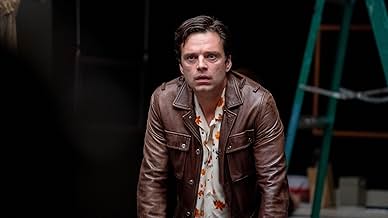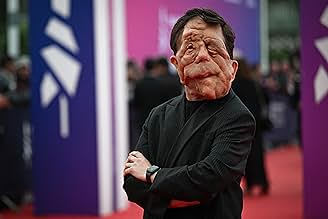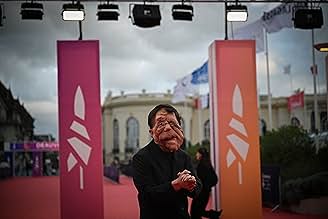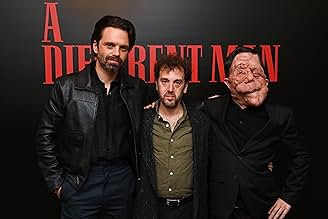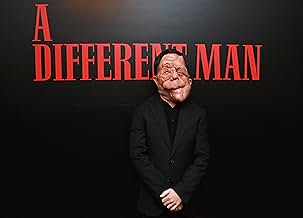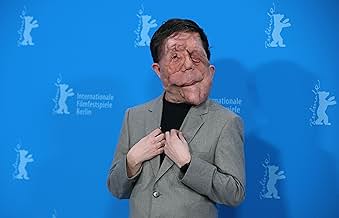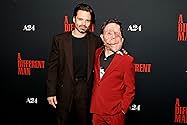Um aspirante a ator passa por um procedimento médico radical para transformar sua aparência, mas esse tão sonhado novo rosto logo se transforma em pesadelo.Um aspirante a ator passa por um procedimento médico radical para transformar sua aparência, mas esse tão sonhado novo rosto logo se transforma em pesadelo.Um aspirante a ator passa por um procedimento médico radical para transformar sua aparência, mas esse tão sonhado novo rosto logo se transforma em pesadelo.
- Indicado a 1 Oscar
- 9 vitórias e 57 indicações no total
Corey R. Taylor
- Luther
- (as Corey Taylor)
Avaliações em destaque
Kudos to Sebastian Stan for committing 100% to a deeply flawed character living through a very complex situation, and for giving an intensely physical performance.
I wish I could say I liked the movie more than I did. It's a compelling premise and gets even more so once the actor Adam Pearson makes his appearance (Pearson also gives a wonderful performance, by the way). But I felt every minute of this film. It's not long, but it feels like it is. It overstayed its welcome for me by a good fifteen minutes or so.
But I liked the central question the movie asks of its main character -- where's the line between being unfairly held back by societal constructs because of our disadvantages vs. Voluntarily opting in to being a victim? Stan's character does some pretty reprehensible things by the time the movie is over, but your heart can't help but go out to the guy.
Grade: B.
I wish I could say I liked the movie more than I did. It's a compelling premise and gets even more so once the actor Adam Pearson makes his appearance (Pearson also gives a wonderful performance, by the way). But I felt every minute of this film. It's not long, but it feels like it is. It overstayed its welcome for me by a good fifteen minutes or so.
But I liked the central question the movie asks of its main character -- where's the line between being unfairly held back by societal constructs because of our disadvantages vs. Voluntarily opting in to being a victim? Stan's character does some pretty reprehensible things by the time the movie is over, but your heart can't help but go out to the guy.
Grade: B.
Simply put, it just feels like a cheap shot when the film begins by presenting the undeniable struggles of the main character's life and has him pursue a cure for completely understandable reasons - and then effectively turns around and says "Actually, all of the problems in his life were his fault, he didn't really get better in ways which matter after that, and let us present a totally idealized version of someone with the exact same condition to prove why."
"Accept yourself for who you are and do not seek external fixes" message might come from the right place, but it is not so inspiring when his condition was effectively shown interfering with something as important as his eyesight and generally affect his quality of life even when nobody was watching.
Furthermore, this film also exhibits the same contrivance which brought down Challengers for me - the insistence that like a duckling, the lead MUST imprint onto the first remotely meaningful relationship shown in the narrative and fail to form anything offscreen even when all the conditions are there for it. It is worse here when that relationship effectively comes from a combination of pity and fetishism - as the film is at least honest enough to acknowledge.
For all of that, the first half is very strong in its depiction of the grime of main character's life, reinforced in a variety of unusual ways like the PSA he is part of. Even the second half has enough neat moments - whether in digging down to the details of stage productions or other smaller twists and turns - to avoid ever feeling like a total loss.
I suppose one reason I'm so disappointed is because this could have been a remarkable narrative of a climber who benefited from the system (in this case, the research breakthrough turning him into "A Different Man") only to pull up the ladder behind him for entirely selfish reasons. Instead, the film pretends the climb was never worth it in the first place and stalls around various meta layers instead of developing the point.
"Accept yourself for who you are and do not seek external fixes" message might come from the right place, but it is not so inspiring when his condition was effectively shown interfering with something as important as his eyesight and generally affect his quality of life even when nobody was watching.
Furthermore, this film also exhibits the same contrivance which brought down Challengers for me - the insistence that like a duckling, the lead MUST imprint onto the first remotely meaningful relationship shown in the narrative and fail to form anything offscreen even when all the conditions are there for it. It is worse here when that relationship effectively comes from a combination of pity and fetishism - as the film is at least honest enough to acknowledge.
For all of that, the first half is very strong in its depiction of the grime of main character's life, reinforced in a variety of unusual ways like the PSA he is part of. Even the second half has enough neat moments - whether in digging down to the details of stage productions or other smaller twists and turns - to avoid ever feeling like a total loss.
I suppose one reason I'm so disappointed is because this could have been a remarkable narrative of a climber who benefited from the system (in this case, the research breakthrough turning him into "A Different Man") only to pull up the ladder behind him for entirely selfish reasons. Instead, the film pretends the climb was never worth it in the first place and stalls around various meta layers instead of developing the point.
"Edward" (Sebastian Stan) is a facially disfigured man, stuck in a rundown apartment, whose life isn't really going anywhere fast. Then he gets a new neighbour. "Ingrid" (Renato Reinsve) is a writer who befriends him and promises him a part in her play. Meantime, his doctors manage to get him on a radical course of treatment that gradually returns his face to a more normal visage. Returning to his flat, and with some fairly grotesque things emerging from his leaky ceiling, he realises that nobody recognises him anymore so he has to assume a different identity. That's when he discovers that "Ingrid" is, indeed, putting on a play - and that the old "Edward" is the title and the topic. He wants the part. It's his part. How to get it though without giving the game away? Add to his frustrations the arrival of "Oswald" (Adam Pearson) who is an ostensibly decent character but who also wants the role, and he has the aesthetics as opposed to the prosthetics. "Ingrid" has tough choices to make but where might this leave "Edward"? There's something quite circular about the way this story pans out. A sort of be careful what you wish for type scenario that gives and removes hope from "Edward" and almost creates a villain of the piece too! Is that merited or is that justified? The drama shines a light on the more shallow attitudes amidst society, on our intolerances and assumptions but it also swipes at the fickleness of friendships, fame and success - all rather engagingly delivered by both Stan and Pearson. It's the former man who positively exudes exasperation as the denouement (only vaguely) skirts the Chaplinesque. It's on that note that it's worth saying this is quite funny at times, too - the writing doesn't try to impose any morals on us, rather it presents us with some scenarios and lets us enjoy and evaluate as we go. It doesn't hang about, and right from the start we hit the ground running as the characters develop, the personalities emerge - for good or bad, and it's well worth a couple of hours in a cinema. I got more from it second time round as I was able to focus a little more on the nuance than the imagery.
"A Different Man," directed by Aaron Schimberg, sets out to explore the unsettling relationship between identity, appearance, and self-acceptance, taking the audience on a strange and, at times, uncomfortable journey through the illusions we create to feel accepted. With a style that flirts with dark humor and existential drama, the film stands out for its peculiar approach and the way it subverts expectations, refusing to deliver a redemptive or simplistic narrative. Sebastian Stan, known for his roles in blockbusters, once again steps out of his comfort zone and takes on a role that demands not only a physical transformation but also a deep dive into a character full of contradictions and vulnerabilities.
Stan plays Edward, a man with a severe facial disfigurement who dreams of becoming an actor, but whose lack of talent is as evident as his insecurity. The story gains strength by presenting Edward not as a stereotype of perseverance or inspiration, but as someone genuinely flawed-pathetic even-whose pursuit of aesthetic change is born from misguided ambition and repressed vanity. Schimberg's script succeeds in portraying Edward in a raw, unfiltered way, without resorting to easy sentimentalism. And Stan, even buried under layers of prosthetic makeup, delivers a sensitive and nuanced performance, capturing the essence of a man torn between the desire to be accepted and the inability to accept himself.
Visually, the film evokes a retro charm, with Super 16mm cinematography giving it a grainy texture and a nostalgic color palette reminiscent of urban dramas from past decades. The dense atmosphere of New York, with its worn-out streets and claustrophobic apartments, adds to the protagonist's sense of isolation and displacement. The visual style complements the subtly absurd tone of the narrative, which at times feels reminiscent of early Woody Allen films, with snappy dialogue and tragicomic situations that shift between the melancholic and the ridiculous.
The dynamic between Edward and Ingrid, played by the charismatic Renate Reinsve, adds an interesting layer to the story. Ingrid is a Norwegian playwright who moves into Edward's building with grand ambitions but carries her own insecurities as well. Reinsve delivers a magnetic performance, balancing her character's charm with a latent selfishness that keeps the audience constantly guessing about her true intentions. Their relationship unfolds in unexpected ways, oscillating between companionship and opportunism, revealing how both feed off each other's vulnerabilities.
The story takes a major turn when Edward, after undergoing a radical surgery that makes him "conventionally attractive," decides to reinvent himself as Guy, a real estate agent. This is where the film delves even deeper into the idea that appearance is just a superficial layer of identity. Even free of his old face, Edward still carries the same timid gestures, the same almost childlike insecurity, and Stan, with precise body language, brilliantly conveys this continuity. One of the film's standout scenes is an awkward encounter in a bar bathroom, where despite his new look, he still feels out of place and inadequate.
The introduction of Oswald (Adam Pearson) expands the discussion on identity and self-perception. Pearson delivers a captivating and charismatic performance, providing a stark contrast to Edward's character. Oswald, who has the same facial condition Edward once had, is confident, magnetic, and genuinely comfortable in his own skin-something Edward never managed to be. Oswald's presence acts almost like an inverted mirror, an unsettling reminder that the transformation Edward sought might never have been purely external. The chemistry between Stan and Pearson is one of the film's highlights, with dialogues filled with tension and a competitive energy, as Edward sees in Oswald everything he wished to be but never could.
The soundtrack adds an extra layer of irony and melancholy to the film, punctuating Edward's journey with tones that swing between dramatic and tongue-in-cheek. The music never underestimates the audience, suggesting complex emotions without forcing them, reinforcing the film's ambiguous tone, which never fully commits to drama or humor.
Overall, "A Different Man" doesn't offer easy answers or comfortable resolutions. The takeaway is that external transformation might change how others see us, but it doesn't necessarily alter how we see ourselves. Schimberg navigates this reflection with intelligence and a touch of provocation, questioning what truly defines our identity and how desperately we seek external validation. It's a film that unsettles, entertains, and, above all, makes you think-without ever falling into clichés or simplistic solutions.
Stan plays Edward, a man with a severe facial disfigurement who dreams of becoming an actor, but whose lack of talent is as evident as his insecurity. The story gains strength by presenting Edward not as a stereotype of perseverance or inspiration, but as someone genuinely flawed-pathetic even-whose pursuit of aesthetic change is born from misguided ambition and repressed vanity. Schimberg's script succeeds in portraying Edward in a raw, unfiltered way, without resorting to easy sentimentalism. And Stan, even buried under layers of prosthetic makeup, delivers a sensitive and nuanced performance, capturing the essence of a man torn between the desire to be accepted and the inability to accept himself.
Visually, the film evokes a retro charm, with Super 16mm cinematography giving it a grainy texture and a nostalgic color palette reminiscent of urban dramas from past decades. The dense atmosphere of New York, with its worn-out streets and claustrophobic apartments, adds to the protagonist's sense of isolation and displacement. The visual style complements the subtly absurd tone of the narrative, which at times feels reminiscent of early Woody Allen films, with snappy dialogue and tragicomic situations that shift between the melancholic and the ridiculous.
The dynamic between Edward and Ingrid, played by the charismatic Renate Reinsve, adds an interesting layer to the story. Ingrid is a Norwegian playwright who moves into Edward's building with grand ambitions but carries her own insecurities as well. Reinsve delivers a magnetic performance, balancing her character's charm with a latent selfishness that keeps the audience constantly guessing about her true intentions. Their relationship unfolds in unexpected ways, oscillating between companionship and opportunism, revealing how both feed off each other's vulnerabilities.
The story takes a major turn when Edward, after undergoing a radical surgery that makes him "conventionally attractive," decides to reinvent himself as Guy, a real estate agent. This is where the film delves even deeper into the idea that appearance is just a superficial layer of identity. Even free of his old face, Edward still carries the same timid gestures, the same almost childlike insecurity, and Stan, with precise body language, brilliantly conveys this continuity. One of the film's standout scenes is an awkward encounter in a bar bathroom, where despite his new look, he still feels out of place and inadequate.
The introduction of Oswald (Adam Pearson) expands the discussion on identity and self-perception. Pearson delivers a captivating and charismatic performance, providing a stark contrast to Edward's character. Oswald, who has the same facial condition Edward once had, is confident, magnetic, and genuinely comfortable in his own skin-something Edward never managed to be. Oswald's presence acts almost like an inverted mirror, an unsettling reminder that the transformation Edward sought might never have been purely external. The chemistry between Stan and Pearson is one of the film's highlights, with dialogues filled with tension and a competitive energy, as Edward sees in Oswald everything he wished to be but never could.
The soundtrack adds an extra layer of irony and melancholy to the film, punctuating Edward's journey with tones that swing between dramatic and tongue-in-cheek. The music never underestimates the audience, suggesting complex emotions without forcing them, reinforcing the film's ambiguous tone, which never fully commits to drama or humor.
Overall, "A Different Man" doesn't offer easy answers or comfortable resolutions. The takeaway is that external transformation might change how others see us, but it doesn't necessarily alter how we see ourselves. Schimberg navigates this reflection with intelligence and a touch of provocation, questioning what truly defines our identity and how desperately we seek external validation. It's a film that unsettles, entertains, and, above all, makes you think-without ever falling into clichés or simplistic solutions.
I was not sure when to laugh or look pensive while watching A Different Man but I went with the audience and laughed when they did and thought when they did. Although I'm not sure I agree we should have laughed when we did because the story is of identity crisis above anything else. In this film, a man with facial deformities assumes another life after a successful surgery but is overwhelmed by what his new life is failing to give him and what the old life in hindsight gave him. It's a surreal experience where you will end up thinking about your own life should given a chance to change it and reborn as a new man. A Different Man shows that changing to another person looks good but it's the case of grass is greener on the other side. Sebastian Stan is adorable here.
(Watched at the 2024 MAMI Mumbai Film Festival.)
(Watched at the 2024 MAMI Mumbai Film Festival.)
Você sabia?
- CuriosidadesThe picture of Edward and his mother on Edward's apartment wall is an actual picture of Sebastian Stan and his mother.
- ConexõesFeatures Cyrano de Bergerac (1950)
- Trilhas sonorasOld Time Cat-O'-Nine
Written by The Lord Invador (as Rupert Grant)
Performed by The Lord Invador (as Lord Invader)
Courtesy of Shanachie Entertainment
License by Arrangement with Fine Gold Music
Principais escolhas
Faça login para avaliar e ver a lista de recomendações personalizadas
- How long is A Different Man?Fornecido pela Alexa
Detalhes
- Data de lançamento
- País de origem
- Idioma
- Também conhecido como
- Un hombre diferente
- Locações de filme
- Empresas de produção
- Consulte mais créditos da empresa na IMDbPro
Bilheteria
- Faturamento bruto nos EUA e Canadá
- US$ 654.254
- Fim de semana de estreia nos EUA e Canadá
- US$ 49.466
- 22 de set. de 2024
- Faturamento bruto mundial
- US$ 1.510.108
- Tempo de duração1 hora 52 minutos
- Cor
- Proporção
- 1.85 : 1
Contribua para esta página
Sugerir uma alteração ou adicionar conteúdo ausente





